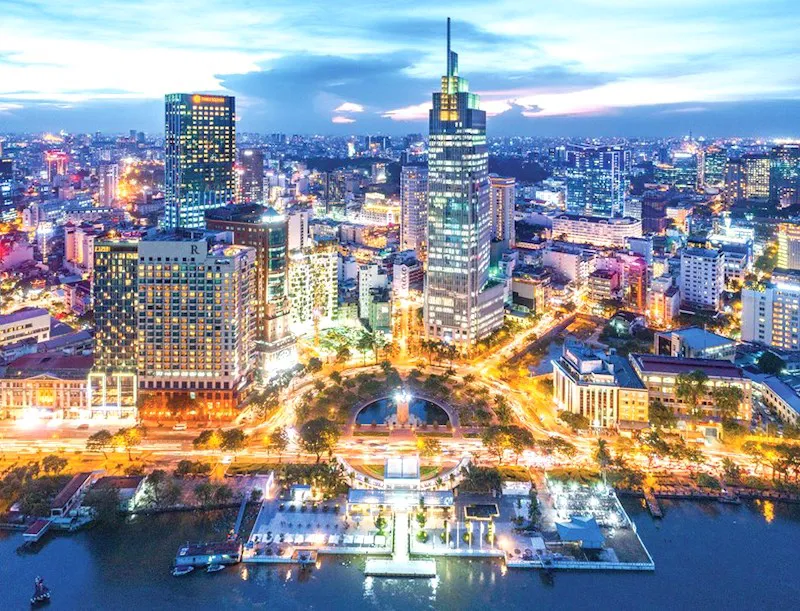The next stage of Vietnam’s development journey: World Bank
For Vietnam to achieve the transformation it aspires to, accelerating a shift to productivity-led growth will be essential.
By any standards, the pace of Vietnam’s development has been extraordinary.
| Ho Chi Minh City is one of the fastest-growing cities in the world. Photo: HCMC Media Center |
Vietnam’s GDP expanded to US$363 billion in 2021 from $21 billion in 1994. Exports of goods and services, valued at $55 billion in 2007, soared to $340 billion in 2021. Vietnam is now the second-largest producer of coffee in the world, after Brazil, both by volume and by value, and the world’s third-largest exporter of fish and seafood, led only by China and Norway.
High levels of foreign direct investment have fueled growth in labor-intensive manufacturing and service sectors. Vietnam’s business sector is bustling with young, dynamic and diverse firms.
Economic growth, the strongest engine of poverty reduction, has improved the welfare of the Vietnamese people. Per capita GDP, a scant $281 in 1994, has reached $3,694 in 2021. Extreme poverty has all but been eliminated, and more than 18% of the population has joined the global middle class. Household access to electricity – only 14% in 1993 – is now practically universal. These are major achievements.
Manuela V. Ferro, World Bank Regional Vice President for East Asia and Pacific underlined: "The question Vietnam now faces is how to reach high-income status through higher productivity and protection of Vietnam's and the world's global assets."
Vietnam’s leadership has set ambitious goals, which include reaching upper-middle-income status by 2035, high-income status by 2045 and achieving net-zero carbon emissions by 2050. In a world starting to emerge from a pandemic and now faced with the global impacts of the war in Ukraine, the top near-term priorities for the Vietnamese people will likely continue to be raising incomes, moving up the value chain, access to higher quality health care and high-quality education, and improved urban environments.
She added that Vietnam's ambitious development agenda also called for achieving climate-resilient growth while enhancing the carbon food-print of its production and energy mix.
Some aspects of the experience of South Korea, which has transitioned from poverty to prosperity in three decades, may offer some insights.
| Manuela V. Ferro, World Bank Regional Vice President for East Asia and Pacific. Photo: WB |
Unlike South Korea, Vietnam’s rich natural resources have supported its steady upward path, and the management of its natural capital will be an important part of guiding its development. For Vietnam, a renewed emphasis on the environment and climate change is a key part of sustaining strong growth and job creation. Building resilience in vulnerable locations like the Mekong Delta and Ho Chi Minh City will keep long-term development goals on track.
However, international experience has shown that while the road from low to middle income occurs mainly through the accumulation of physical and human capital and the use of natural resources, the transition from middle to high income is driven by the efficient use of new and existing assets and resources, including human resources. To make the leap from middle-income status, a takeaway for Vietnam is that South Korea's rapid advancement was the result of a combination of more investments in physical and human resources and, above all, an increasing reliance on efficiency gains.
As such, for Vietnam to achieve the transformation it aspires to, accelerating a shift to productivity-led growth will be essential.
The World Bank has long had a productive and supportive relationship with Vietnam. What began as a rented World Bank office in two rooms at a hotel in 1994 and concessional financing for primary education and highway rehabilitation has burgeoned into a program that has provided knowledge-embedded financing worth $24 billion since 1994, with a transformational impact on Vietnam’s development in areas of education, energy, and health care.
The World Bank’s comprehensive analytical support to the government in establishing a roadmap for World Trade Organization accession played an important supporting role in Vietnam’s successful integration into modern global trade. More recently, the publication of the Vietnam 2035 report has provided many new policy ideas to help Vietnam achieve its goals and take a long-term perspective.
The private sector arm of the World Bank Group, International Finance Corp. (IFC), has catalyzed over $5 billion of long-term investment to date to support the country’s private sector to realize its potential and become an engine of economic growth, focusing on infrastructure, manufacturing, agribusiness, renewable energy, and the financial sectors.
Vietnam has undergone a momentous economic transformation over the last quarter-century, and the World Bank has been a trusted and reliable partner along the way.
"To sustain and build upon its success over the next 25 years, Vietnam has clearly articulated its needs and aspirations, and the World Bank is ready to continue to support Vietnam in achieving them. We look forward to working closely with Vietnam and its people on the next phase of its development journey," Ferro said.
(*) Manuela V. Ferro was appointed World Bank Regional Vice President for East Asia and Pacific in September 2021. Prior to this appointment, she was World Bank Vice President of Operations Policy and Country Services (OPCS), where she oversaw the World Bank’s corporate policies on financing and analytical services.











